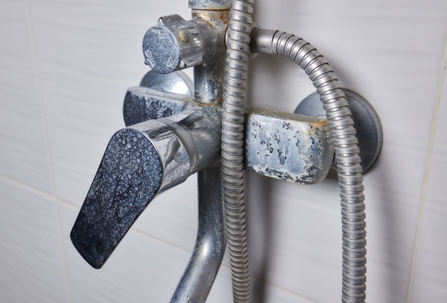What is hard water?
Hard water contains elevated concentrations of minerals—primarily calcium and magnesium—that pick up naturally as groundwater moves through limestone and other mineral-rich rock. In Florida, groundwater and local water sources commonly produce water hardness well above the “soft” range. Many Florida homes test in the 120–300 ppm range (or higher), which is considered hard to very hard water.
How hard water affects your plumbing system
Minerals in hard water form a chalky buildup called limescale, which adheres to the inside of pipes, valves, and fixtures. Over time this scale can:
- Restrict water flow and reduce water pressure.
- Shorten the life of water heaters by insulating heating elements and causing inefficiency.
- Increase energy usage as appliances and heaters work harder to reach set temperatures.
- Lead to clogged pipes, corroded fittings, and leaks that require costly repairs.
Effects on appliances and fixtures
Appliances that use or heat water are particularly vulnerable:
- Dishwashers: Cloudy glassware, clogged spray arms, and shorter appliance life.
- Washing machines: Soap and detergent buildup, dingy or stiff clothes, and increased maintenance.
- Water heaters: Sediment and scale reduce efficiency and can cause early failure.
- Coffee makers & ice machines: Blocked lines, reduced flow, and poor-tasting beverages or cloudy ice.
- Faucets & showerheads: Clogged aerators, uneven spray, and scale that is hard to remove.
How hard water affects skin and hair
Many homeowners assume harsh soaps or skincare are to blame for dryness—but hard water plays a big role:
Skin
Mineral residue from hard water leaves a thin film on skin that interferes with natural oils and moisture balance. This can cause:
- Dry, itchy skin
- Flare-ups of eczema or sensitive-skin conditions
- A feeling of tightness after bathing
Hair
Hard water minerals coat hair strands and block moisture, causing:
- Dull, brittle hair and split ends
- Color fade for dyed hair
- Residue that makes hair feel heavy or look flat
Visible signs on surfaces and glass
Hard water leaves obvious traces around the home:
- White scale on faucets, shower doors, and tile.
- Cloudy or spotted glassware and dishes.
- Etching or dulling of metal and glass finishes over time.
No amount of scrubbing will permanently fix these issues unless you address the water itself.
How to protect your home: water softeners and alternatives
The most effective long-term solution is a whole-home water softener. Softeners typically replace calcium and magnesium ions with sodium or potassium ions, preventing scale buildup and improving water performance across every faucet and appliance.
Benefits of a professionally installed water softener:
- Reduced scale in pipes, fixtures, and appliances
- Lower energy bills and longer appliance life
- Softer skin and shinier, healthier-looking hair
- Cleaner dishes and fewer detergent needs
Alternatives and additions include targeted descalers, point-of-use filters (for drinking water), and routine maintenance such as descaling appliances and flushing water heaters. However, for whole-home protection, a properly sized water softener is generally the best option.
When to call a professional
If you notice reduced water pressure, recurring scale on fixtures, frequent appliance problems, or dry skin and hair that doesn’t respond to skincare changes, it’s a good time to consult a plumber. A professional can:
- Test your water hardness and mineral profile
- Recommend the right size and type of water softener or treatment system
- Install and maintain the system for long-term performance
Ready to fix hard water in your Tampa home?
Contact Alpine Plumbing for professional water testing, water softener recommendations, and expert installation in the Tampa Bay area.
Alpine Plumbing at (813) 940-4943 or visit our contact page for expert advice and professional installation.

